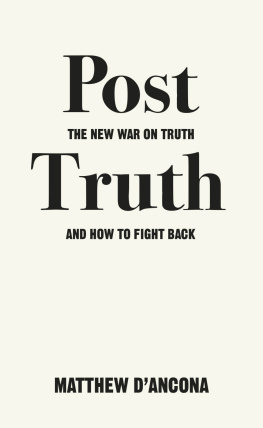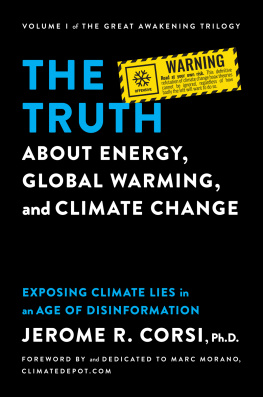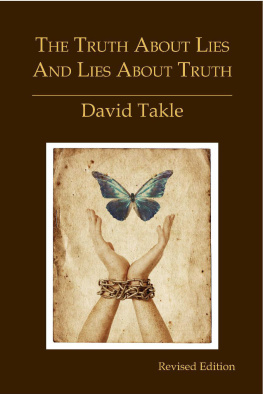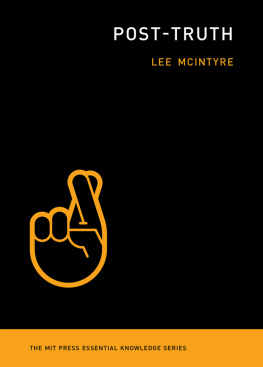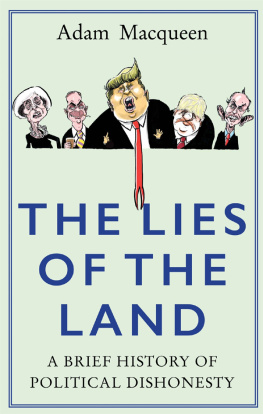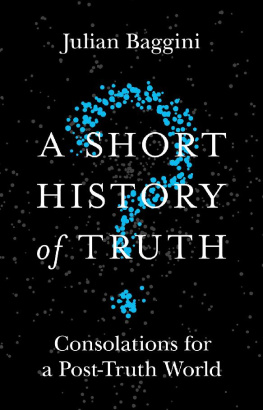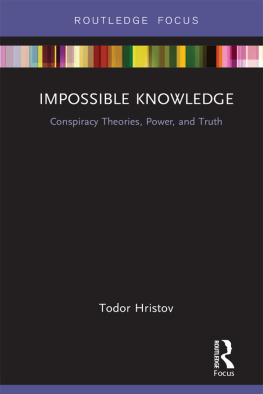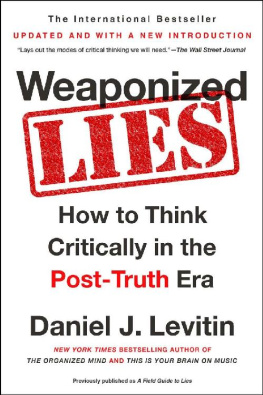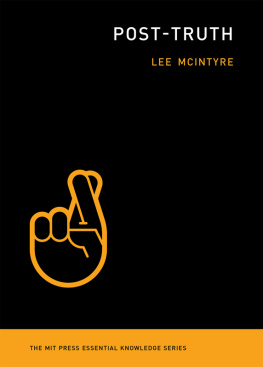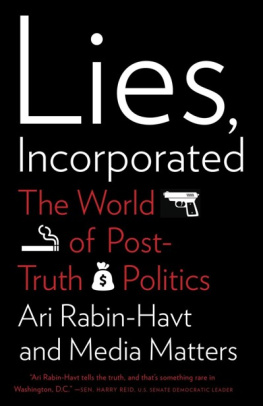This ebook is copyright material and must not be copied, reproduced, transferred, distributed, leased, licensed or publicly performed or used in any way except as specifically permitted in writing by the publishers, as allowed under the terms and conditions under which it was purchased or as strictly permitted by applicable copyright law. Any unauthorized distribution or use of this text may be a direct infringement of the authors and publishers rights and those responsible may be liable in law accordingly.
Epub ISBN: 9781473551923
Version 1.0
3 5 7 9 10 8 6 4 2
Ebury Press, an imprint of Ebury Publishing,
20 Vauxhall Bridge Road,
London SW1V 2SA
Ebury Press is part of the Penguin Random House group of companies whose addresses can be found at global.penguinrandomhouse.com
Copyright Matthew dAncona 2017
Cover design by Two Associates
Matthew dAncona has asserted his right to be identified as the author of this Work in accordance with the Copyright, Designs and Patents Act 1988
Quotations from My Country Right or Left by George Orwell (Copyright George Orwell, 1940) and Nineteen Eighty-Four by George Orwell (Copyright George Orwell, 1948) reprinted by permission of Bill Hamilton as the Literary Executor of the Estate of the Late Sonia Brownell Orwell and Secker & Warburg Ltd.
Quotations from Denying the Holocaust by Deborah Lipstadt (Penguin Books, 2016). Reproduced by permission of Penguin Books Ltd. Copyright The Vidal Sassoon International Center for the Study of Antisemitism, The Hebrew University of Jerusalem, 1993
First published by Ebury Press in 2017
www.penguin.co.uk
A CIP catalogue record for this book is available from the British Library
ISBN 9781785036873
In memory of my mother
Helen dAncona (19372014)
A life-long truth-teller
PREFACE: NEAR-DEATH, POST-TRUTH
In September 2016 I had a brush with the Grim Reaper. Suffice it to say that a perforated ulcer compounded by abdominal sepsis is not good news; or, to put it another way, I am glad that I didnt see the fatality rates until I was out of hospital.
I felt extraordinarily fortunate, though guilty about the worry I had caused my family. I also felt profound gratitude to the doctors who had saved me and helped me recover more quickly than first anticipated. I marvelled at the medical science that had brought me back from the brink: because the brink is a place where experts so often reviled these days are just what you need.
To adapt Dr Johnson, such experiences do concentrate the mind. Once discharged, I had a single professional objective: to be back on the journalistic beat for the US presidential election on 8 November. Though, like most political commentators, I expected Hillary Clinton to win, I was convinced that Donald Trumps capture of the Republican nomination was more than an anomaly a wrinkle in the political fabric that would soon be smoothed over. His victory made it ludicrous to argue that this was business as usual (though some tried). I was struck that my teenage sons, neither of them Trump supporters, were not remotely surprised by the outcome. Their generation had intuited a change in the air of which mine had been mostly oblivious.
But what change? Inescapably, Trump stalks the pages of this book like an orange panther. But he is not its prime subject. Nor is this a book about the far Right, or any particular ideology. It is quite straightforward to imagine a Left-wing counterpart to Trump surging to power on a wave of falsehood and phony populism. The problem lies deeper.
My theme is epistemological which is to say, related to knowledge, its nature and its transmission. Specifically, I explore the declining value of truth as societys reserve currency, and the infectious spread of pernicious relativism disguised as legitimate scepticism. If indeed we live in a Post-Truth era, where do its roots lie? What are its principal symptoms? And what can we do about it?
Generally speaking I share Saul Bellows distaste for crisis chatter. That said, there are times when it is wrong to stay silent and affect the pose of the professionally unruffled. After more than twenty-five years as a journalist I would be betraying my trade if I stood by as its central value accuracy was degraded by hucksters and snake-oil salesmen. Those of us who work for the print media get things wrong, but we are also held to account for our mistakes: rightly so. So what happens when lies not only proliferate but also seem to matter less or even not at all?
I am also a trustee of the Science Museum in London. In its stunning halls and galleries, the work of its remarkable team, it feels like an affront to the greatest revolution in the history of human knowledge that so much fakery, pseudo-science and medical nonsense is now in circulation. The notion of science as a conspiracy rather than a world-changing field of inquiry used to be confined to cranks. No longer. It seems to me intolerable that this should be so.
I mention these details because this short book is essentially a personal tract, rather than a dispassionate primer. This is not a moment for hysteria. Equally, it is no time to be sanguine, or loftily confident that what we call Post-Truth is merely the latest fashion on the intellectual catwalk and one that will fade into insignificance of its own accord.
As so often, George Orwell provides a text for our times as well as for his own in this case, in his 1942 essay Looking Back on the Spanish War. He recalled the terrifying success of Fascist propaganda, especially concerning Russian intervention in the conflict:
This kind of thing is frightening to me, because it often gives me the feeling that the very concept of objective truth is fading out of the world. After all, the chances are that those lies, or at any rate similar lies, will pass into history. How will the history of the Spanish war be written? If Franco remains in power his nominees will write the history books, and (to stick to my chosen point) that Russian army which never existed will become historical fact, and schoolchildren will learn about it generations hence. But suppose Fascism is finally defeated and some kind of democratic government restored in Spain in the fairly near future; even then how is the history of the war to be written? What kind of records will Franco have left behind him? Suppose even that the records kept on the Government side are recoverable even so, how is a true history of the war to be written? For, as I have pointed out already, the Government also dealt extensively in lies. From the anti-Fascist angle one could write a broadly truthful history of the war, but it would be a partisan history, unreliable on every minor point. Yet, after all, some kind of history will be written, and after those who actually remember the war are dead. It will be universally accepted. So for all practical purposes the lie will have become truth.
There was, Orwell fully acknowledged, nothing new in the notion of historical bias. But what is peculiar to our own age is the abandonment of the idea that history could be truthfully written.
This was an early premonition of the Post-Truth era. Orwell feared that totalitarianism would be the force that destroyed the very notion of veracity. As we shall see, the pressures bearing down upon truth today are more complex, dispersed and insidious. But they are also more unsettling precisely because they do not emanate from an identifiable Big Brother or Goebbels or

